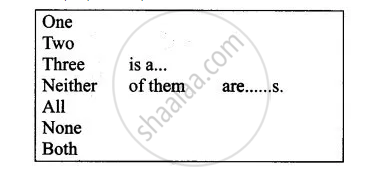Advertisements
Advertisements
प्रश्न
"My father lived at Blenheim then,
Yon little stream hard by;
They burnt his dwelling to the ground,
And he was forced to fly;
So with his wife and child he fled,
Nor had he where to rest his head.
"With fire and sword the country round
Was wasted far and wide,
And many a childing mother then,
And new-born baby died;
But things like that, you know, must be
At every famous victory;
Read the lines given above and answer the question that follow.
What does Kasper’s attitude signify?
उत्तर
Old Kaspar unquestioningly accepts the loss of innocent women and children in the Battle of Blenheim as one of the prices of the glorious victory. His complacent attitude is not unlike that of modern politicians who dismiss the deaths of innocent civilians in arenas of war by referring to them with the impersonal phrase “collateral damage.”
APPEARS IN
संबंधित प्रश्न
Here are some fact from Einstein’s life. Arrange the in chronological order.
[1 ] Einstein publishes his special theory of relativity.
[2] He is awarded the Nobel Prize in Physics.
[3] Einstein writes a letter to U.S. President, Franklin D. Roosevelt, and warns against
Germany’s building of an atomic bomb.
[4 ] Einstein attends a high school in Munich.
[5 ] Einstein’s family moves to Milan.
[6 ] Einstein is born in the German city of Ulm.
[7 ] Einstein joins a university in Zurich, where he meets Mileva.
[8 ] Einstein dies.
[ 9] He provides a new interpretation of gravity.
[10 ] Tired of the school’s regimentation, Einstein withdraws from school.
[11 ] He works in a patent office as a technical expert.
[12 ] When Hitler comes to power, Einstein leaves Germany for the United States.
What happens when the zip on his carry-on bag gives way?
Answer the following question in one or two sentences.
What do you think Dinamani is the name of? Give a reason for your answer.
Both, all, neither, none

What is one thing that dreams can never tell?
Where did father bring the ladder from?
Work in small groups. Ask your partner the questions given below. If possible, ask him/her a reason for saying Yes or No. Then tick Yes/ No, whichever is proper.
1. Do you have a separate room for sleep and study? Yes/No
2. Would you prefer to live in a joint family? Yes/No
3. Do you get on with people? Yes/No
4. Do you like the area you live in? Yes/No
5. Do you find the place overcrowded? Yes/No
6. Do you use public transport? Yes/No
7. Would you like a vehicle of our own? Yes/No
8. Do you like reading? Yes/No
9. Would you like to be a teacher/doctor/engineer/architect? Yes/No
The word ‘tip’ has only three letters but many meanings.
Match the word with its meanings below.
- finger tips – be about to say something
- the tip of your nose – make the boat overturn
- tip the water out of the bucket – the ends of one’s fingers
- have something on the tip of your tongue – give a rupee to him, to thank him
- tip the boat over-empty a bucket by tilting it
- tip him a rupee-the pointed end of your nose
- the tip of the bat – if you take this advice
- the police were tipped off – the bat lightly touched the ball
- if you take my tip – the end of the bat
- the bat tipped the ball – the police were told or warned
Now let us look at the uses of the word break. Match the word with its meanings below. Try to find out at least three other ways in which to use the word.
- The storm broke – could not speak; was too sad to speak
- Daybreak – this kind of weather ended
- His voice is beginning to break – it began or burst into activity
- Her voice broke and she cried – the beginning of daylight
- The heat wave broke – changing as he grows up
- Broke the bad news – end it by making the workers submit
- Break a strike – gently told someone the bad news
- (Find your own expression. Give its meaning here)
What is the central idea of the poem, John Brown?
